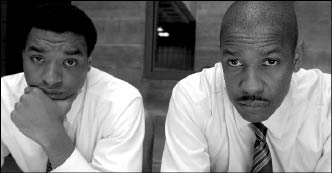Bank It: Inside Man
by M. Faust

Here’s what’s not perfect about Inside Man, the bank heist thriller directed by Spike Lee: The key to the robbery lies in a memento that in all probability would have been destroyed by its owner rather than stored; and it wasn’t entirely clear to me precisely how the crime paid off.
The former is one of those things that you just have to overlook in movies—especially one by a first-time screenwriter, Russell Gerwitz, whose script is otherwise masterful. The latter I may simply have overlooked, failing to heed the warning of master thief Dalton Russell (Clive Owen) to the audience to “Pay strict attention to what I say, because I choose my words carefully and I never repeat myself.”
If you just like to sit back and have a movie wash over you, you might add to that list that this is a movie that engages your intelligence: it never goes exactly where you think it will. Me, I put that in the plus column of a movie that in every other way is pretty much perfect. It couldn’t be any better than it is.
Or, to put it another way, it’s as good as you might hope a film starring Denzel Washington, Clive Owen and Jodie Foster might be.
Openly hearkening to ’70s classics like Dog Day Afternoon and Serpico, Inside Man begins as four people in masks and painter’s coveralls rob a downtown Manhattan bank. Taking the few dozen customers and employees hostage, they work with cold efficiency. When the police show up outside, they make the standard demands: provide us with a bus and a jet, or we’ll start throwing out bodies.
The situation is handed to NYPD hostage negotiator Keith Frazier (Washington, looking appropriately less sleek than usual), a detective being given a chance to clear himself after a pile of money disappeared from a recent case of his. Frazier sets up standard operating procedure to deal with the situation. But after a while both he and we start to realize that these thieves are up to more than it appears.
Further complicating Frazier’s job is the appearance of Madeline White (Foster), an executive level “fixer” who has been employed to get something out of the bank before the thieves get to it.
A large part of what makes Inside Man so enjoyable is the way it turns the clichés of the genre on their ears. But even before that part of the story kicks in, Lee does a grand job of crafting what we initially assume will be no more than a routine thriller.
Produced by the ubiquitous Brian Grazer, Inside Man may flash the traditional “A Spike Lee Joint” before the titles, but it’s not really a Spike Lee film, in the sense of personal involvement that he usually has with his movies. Of late, Lee has been involved in making documentaries and quirky features like She Hate Me and Bamboozled that received only marginal theatrical distribution. But when he doesn’t have an axe to grind, Lee has always been an impeccable craftsman, and Inside Man amply demonstrates that he could be one of Hollywood’s top directors if he was content to do more work-for-hire.
That’s not to say that his work here is anonymous: it opens with a character addressing the audience, a device he’s employed since She’s Gotta Have It, and there’s the usual “Spike shot” with Washington on a moving track. More than those bits, though, Lee puts his thumbprint on this with his depiction of Manhattan characters and situations. He’s rivaled only by Martin Scorsese at capturing New York ambiance, and here he seems to be amusing himself in between the carefully composed camera pans with a gallery of people you would only ever find in his hometown. (My favorite was the construction worker who knows Albanian but can’t speak it.)
He also gets the best out of actors, preferring to use two cameras to capture dialogue scenes rather than having a stand-in with his back to the camera while the star reads his lines. (It makes a difference.) In return he gets delightful performances from his three stars: Washington and Foster play nicely against type, while Owen manages to make an impression despite having his mug hidden behind a mask for most of the film.
I couldn’t have enjoyed it more.
|
Issue Navigation> Issue Index > v5n12: Here Comes the Neighborhood (3/23/06) > Film Reviews > Bank It: Inside Man This Week's Issue • Artvoice Daily • Artvoice TV • Events Calendar • Classifieds |









 Current Issue
Current Issue